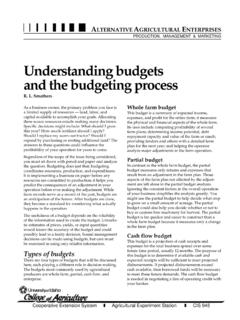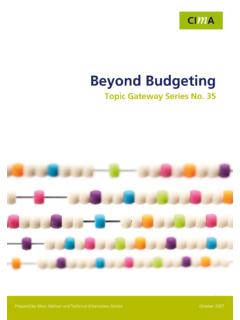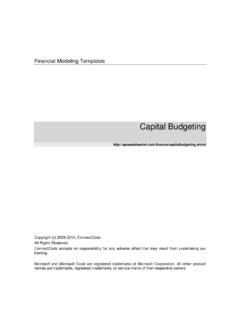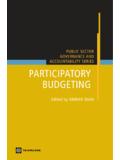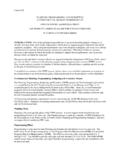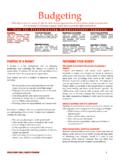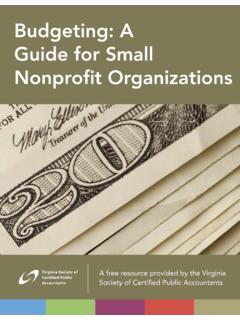Transcription of Role of the Legislature Chapter 1 in the Budget …
1 ISSN 1608-7143 OECD Journal on BudgetingVolume 7 No. 3 OECD 20071 Chapter 1 Role of the Legislature in the Budget process : Recent trends and InnovationsbyPaul Posner and Chung-Keun Park*This article provides a broad historical and conceptual overview ofthe evolution of legislative roles in budgeting , and assesses thepotential consequences of expanded roles . By analysing countrybudget institutions and practices, the article proposes ways toestablish sound relationships between the executive and legislativebranches of government.* Professor Paul Posner is the Director of the Masters in Public AdministrationProgram at George Mason University, Virginia, United States, and former ManagingDirector of the United States Government Accountability Office. Chung-Keun Park isa Project Manager in the budgeting and Public Expenditures Division of the PublicGovernance and Territorial Development Directorate, OF THE Legislature IN THE Budget process : RECENT trends AND INNOVATIONSOECD JOURNAL ON budgeting VOLUME 7 No.
2 3 ISSN 1608-7143 OECD 200721. IntroductionThe two most important players in the Budget process are the legislatureand the executive Budget office. Their respective role and power in the budgetprocess differ from country to country and are influenced by many factors,including the wider historical, constitutional and political context as well asthe legal and procedural aspects of the Budget process itself and internallegislative structures and constitutional division of power between executive and legislativebranches ranges from presidential systems of separation of powers, such as inthe United States, where the Legislature has a strong role, to Westminsterparliamentary systems, where the executive generally dominates. In between aremodified forms including semi-presidential systems and non-Westminsterparliamentary the 20th century, the size and complexity of government grewexponentially in OECD countries, along with a greater focus on internationalissues and conflict affairs.
3 In some countries, these trends promoted greaterinfluence by the executive in budgeting . In recent years, however, executive roleshave been challenged, as legislatures in certain countries have asserted new rolesand responsibilities in budgeting . This trend is driven by many different factors,including the increased political stress on fiscal policy because of fiscalconstraints and changes in the composition and cohesiveness of parties andparty systems. Even in the United Kingdom, the core Westminster parliamentarysystem, new measures were introduced in the 1990s to support the Legislature sefforts to more effectively control public expenditure. The need to respond tocurrent fiscal problems and future fiscal risks arising from ageing populationsas well as performance management and Budget reforms will continue tochallenge both executive and legislative officials to adapt and strengthen theirroles in the Budget process .
4 As budgeting becomes more relevant for a widerrange of policy and management challenges, officials throughout governmentwill increasingly focus on how they can influence these choices by repositioningtheir roles in Budget formulation, execution and the recent changes in this area, OECD member countries at the 2006annual Senior Budget Officials meeting requested that the OECD secretariatconduct an in-depth study on this topic. For this purpose, a meeting was held inParis in October 2006, with delegates from nine countries1 representative of fourdifferent forms of government: presidential, semi-presidential, WestminsterROLE OF THE Legislature IN THE Budget process : RECENT trends AND INNOVATIONSOECD JOURNAL ON budgeting VOLUME 7 No. 3 ISSN 1608-7143 OECD 20073parliamentary, non-Westminster parliamentary. This article draws on thepresentations and discussions at that meeting and on previous OECD work inthis area (Lienert and Jung, 2004).
5 While it provides a theoretical background,the article focuses on the practical aspects of what the two players actually doin the Budget process . By analysing each country s Budget institutions andpractices, this article highlights policy suggestions for developing co-operationand establishing sound relationships between the two branches of article provides a broad historical and conceptual overview ofthe evolution of legislative roles in budgeting , and assesses the potentialconsequences of expanded legislative roles . The article also contains a reviewof the relationship between the two branches and some policy suggestions toenhance executive-legislative co-operation in budgeting . The article draws onthe experiences of the nine countries that participated in the OECD meeting,highlighting the practices and procedures that are followed by the legislatureand the executive during the Budget formulation and execution legislatures and The historical and institutional backgroundThe legislative role in budgeting has evolved over centuries.
6 In England,the ascendancy of the Legislature as a political and fiscal institution wasintegral to the shift from a monarchy to a democracy. Other countries havehad similar independent exercise of the power of the purse was a primary anchorof the Legislature s emerging role in the governance process . Determining theallocation of resources among competing claims was critical to establishing thelegitimacy and authority of the Legislature as an institution competing with time, the Legislature s authority to appropriate public funds became thefoundation for public budgeting and accountability, preceding the developmentof budgets by the executive. The fundamental power of appropriation gave thelegislature formative influence in allocating funds among competing went beyond this ex ante role to assume ex post influence over theprocess of Budget execution and programme administration.
7 Agencies weretypically bound to follow the levels in detailed appropriation accounts in order tospend funds during the course of the year. Legislative influence over executiveagencies was further reinforced by the exercise of oversight over agencies management and Budget implementation, either directly or throughindependent audit roles currently exercised by legislatures actually range widely. Themajor influences include broader political, legal and institutional forcesROLE OF THE Legislature IN THE Budget process : RECENT trends AND INNOVATIONSOECD JOURNAL ON budgeting VOLUME 7 No. 3 ISSN 1608-7143 OECD 20074beyond the control of legislatures , as well as internal legislative structures andprocesses that can be changed by the Legislature constitutional division of responsibilities between the executive andthe Legislature has a major impact on legislative-executive roles in presidential separation-of-powers systems, like in the United States, thelegislature has a significant role in policy formulation and in budgeting , partlyowing to its independent election by constituencies that are different fromthose of the president.
8 Legislative powers are arguably weakest under theWestminster system, where the executive leadership is drawn from theparliament and where the Legislature is politically obligated to support thegovernment. In between are modified forms including the semi-presidentialsystem (France, Korea), the parliamentary republic (Germany, Italy) and thenon-Westminster parliamentary monarchy (Netherlands, Sweden) (Lienert,2005, p. 1).Party systems play a fundamental role in determining the degree ofindependence of the Legislature vis- -vis the executive. Strong, cohesive two-party systems will generally work to attenuate legislative influence. In thesesystems, legislatures have a working majority to support executive these circumstances, there is often little incentive for the executive tobargain and little incentive for the Legislature to disagree.
9 In parliamentarysystems, the majority party in the Legislature can precipitate a downfall ofits own government by voting against the Budget or by making majoramendments. The executive s influence is further strengthened if the nationalparty selects legislative candidates, thereby ensuring that legislative membersowe their allegiance more to national party leaders than to local the other hand, weaker two-party systems, as well as multiple-partysystems, generally strengthen the role of legislatures in budgeting and in thepolicy process more broadly. In these systems, the executive must bargainwith more independent legislative actors to ensure majority support forbudgets and policy goals. Sometimes this bargaining takes place outside offormal legislative channels and institutions, such as in pre-budgetarynegotiations, but should nonetheless be considered as an exercise of legislativeinfluence over executive institutional structure and role of the Legislature have a bearing onthe Legislature s ability to act.
10 Generally speaking, bicameral legislatures mayhave greater possibilities for influence, particularly if one house has a politicalstanding that is different from that of the government s majority. Thus, forinstance, the upper house in Australia and in Germany has different electoralconstituencies and cycles that can lead to control by parties outside of themajority government. Also, legislatures that are full-time governing bodieswill tend to attract members with an interest in promoting the Legislature srole, as opposed to legislatures composed of part-time members with careersROLE OF THE Legislature IN THE Budget process : RECENT trends AND INNOVATIONSOECD JOURNAL ON budgeting VOLUME 7 No. 3 ISSN 1608-7143 OECD 20075outside of government. Legislative bodies whose members serve for a numberof terms tend to have greater expertise and interest in participating ingoverning than do those where membership is considered to be structure of the Budget will have a major bearing on the role playedby the Legislature in the Budget process .










